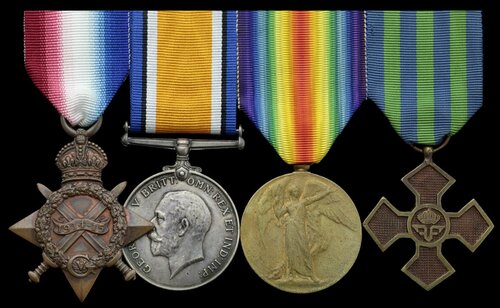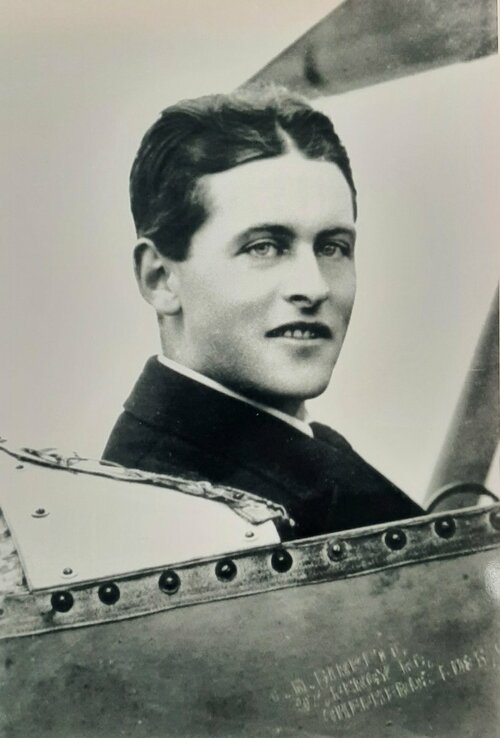Auction: 22001 - Orders, Decorations and Medals
Lot: 384
Four: Group Captain F. E. P. Barrington, Royal Air Force, late Royal Naval Air Service, who served in the Dardanelles and later as part of the 'Romanian Flight' before being posted to North Russia in 1919 and finally serving with the Mediterranean Command during the Second World War
1914-15 Star (Flt. S. Lt. F. E. P. Barrington. R.N.A.S.); British War and Victory Medals (Capt. F. E. P. Barrington. R.A.F.); Commemorative Cross for War 1916-1919, slight polishing and pitting, overall very fine (4)
Francis Edward Philip Barrington was born at Cheeverstown, Clondalkin, Dublin on 3 November 1892, the son of Philip and Susan Barrington, his father was Agricultural Superintendent to the Royal Dublin Society. Educated at Charterhouse School under The Reverend Dr. Rendall he later entered Caius College, Cambridge on 1 October 1911 with a scholarship for Mathematics and Natural Sciences. Barrington excelled athletically whilst at Cambridge, joining the College Athletics Club and the Association Football team but also acting as treasurer for the Science and Art Society. Graduating with a B.A. in mathematics Barrington was articled to a Chartered Accountant in 1914.
With the outbreak of the Great War he joined the Royal Naval Air Service on 13 June 1915 with the rank of Flight Sub-Lieutenant. Transferring to the Royal Naval Gunnery School, H.M.S. Excellent at Whale Island, Portsmouth on 31 December 1916. He went on to obtain a Royal Aero Club certificate number 1541 on 7 August 1915 at the Grahame-White School, Hendon. However this qualification may have been slightly premature as he was involved in a crash only the next month on 17 September at Chingford. Transferred to Dover on 23 November 1915 he went on to join No. 2 Wing R.N.A.S. at Mudros, Isle of Lemnos on 9 December 1915. Barrington’s work here proved his ability, with one report written on 28 March 1916 stating: ‘This Officer has done much good flying on Active service, and is recommended for promotion’. No. 2 Wing’s role here was mainly based around reconnaissance although they were later outfitted for bombing missions against Ottoman and Bulgarian territory, for this reason they were still stationed in the Dardanelles after the Gallipoli evacuation when Romania entered the war on 27 August 1916.
The limited Romanian Air Force was unable to prevent the German forces from bombing Bucharest and their Government soon requested Allied air support. Plans to send out a Royal Flying Corps Squadron were halted by fears that the Romanian resistance would not last that long enough for one to be raise and equipped. However with R.N.A.S. pilots available in the Mediterranean the Admiralty sent a flight of aircraft on the 300-mile journey over enemy lines and hand the planes over to the Romanian Air Force. Barrington was chosen as Pilot for one of the Henry Farman planes in the second Wave, departing Mudros on 21 November 1916. They completed their journey safely after six and a half hours of flying, upon arrival the suggestion had been that the pilots would attempt a return journey however instead they remained on as advisors to the Romanian Air Force.
Unfortunately the Romanian Forces were being swiftly beaten back and with the fall of Bucharest on 6 December 1916 the British Pilots were ordered to return to England. Romanian Flight was escorted to Allied Russia by Locker-Lampson’s Armoured Car Expeditionary Force along with a number of nurses from the Scottish Women’s Hospital. Promoted Flight Lieutenant during the retreat on 31 December 1916 Barrington left Russia via Archangel on 27 January 1917 and disembarked in England on 6 February 1917 to discover that his next posting was as a flying instructor at Redcar R.N.A.S. Station. Posted to the Royal Air Force he was transferred to 205 Training Depot Station, Vendome near Paris on 29 April 1918. Barrington served out the rest of the war here as a Flying Instructor with the rank of Captain.
After the war he remained with the R.A.F., seeing service as Chief Instructor at the R.A.F. College 1922-24 and further in Iraq, Palestine and Egypt between 1924-29. Promoted Wing Commander in 1931 he served with the Air Ministry until 1934 when he was appointed Chief Instructor with the Cambridge University Air Squadron. Earning an M.A. that same year in Mechanical Science Tripose he was promoted Group Captain in 1935 and placed in command of R.A.F. Calafrana, Malta in 1936. Appointed to command R.A.F. Mediterranean in July 1938 by 1940 he was the Commanding Officer of 200 Group Coastal Command, Gibraltar. Later transferring to R.A.F. Northwood he remained with them for what remained of the war (Medals). Retiring in July 1946 he died on 11 August 1957 at Worthing, Sussex; sold together with copied research including a typed biographical summary, service records, photographs and articles as well as school and university records, Royal Naval, Royal Air Force and Royal Naval Air Service lists along with letter from the Fleet Air Army Museum.
Subject to 20% VAT on Buyer’s Premium. For more information please view Terms and Conditions for Buyers.
Sold for
£850
Starting price
£180







